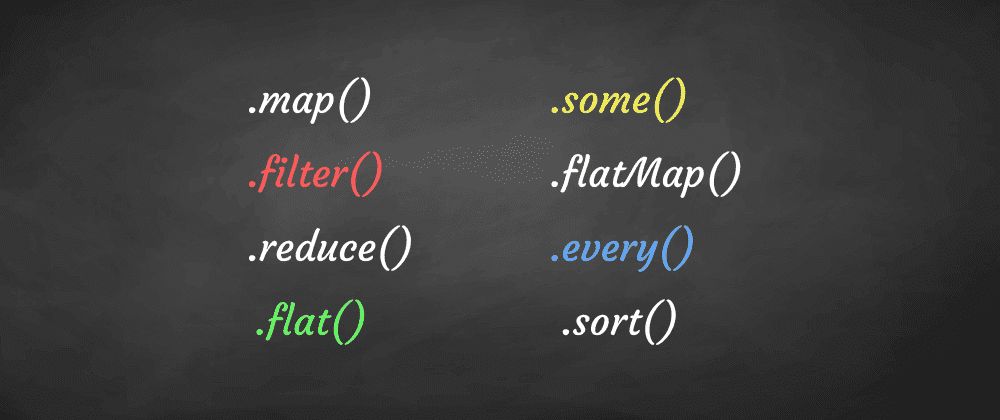【JS】721- 15个必须知道的JavaScript数组方法

1.some() 2. reduce() 3. Every() 4. map() 5. flat() 6. filter() 7. forEach() 8. findIndex() 9. find() 10. sort() 11. concat() 12. fill() 13. includes() 14. reverse() 15. flatMap()
注意,大多数情况下,我们将简化作为参数传递的函数。
// Instead of using this waymyAwesomeArray.some(test => { if (test === "d") { return test }})// We'll use the shorter onemyAwesomeArray.some(test => test === "d")
1、some()
const myAwesomeArray = ["a", "b", "c", "d", "e"]myAwesomeArray.some(test => test === "d")//-------> Output : true
2、reduce()
const myAwesomeArray = [1, 2, 3, 4, 5]myAwesomeArray.reduce((total, value) => total * value)// 1 * 2 * 3 * 4 * 5//-------> Output = 120
3、Every()
const myAwesomeArray = ["a", "b", "c", "d", "e"]myAwesomeArray.every(test => test === "d")// -------> Output : falseconst myAwesomeArray2 = ["a", "a", "a", "a", "a"]myAwesomeArray2.every(test => test === "a")//-------> Output : true
4、map()
const myAwesomeArray = [5, 4, 3, 2, 1]myAwesomeArray.map(x => x * x)//-------> Output : 25// 16// 9// 4// 1
5、flat()
const myAwesomeArray = [[1, 2], [3, 4], 5]myAwesomeArray.flat()//-------> Output : [1, 2, 3, 4, 5]
6、filter()
const myAwesomeArray = [ { id: 1, name: "john" },{ id: 2, name: "Ali" }, { id: 3, name: "Mass" },{ id: 4, name: "Mass" },]myAwesomeArray.filter(element => element.name === "Mass")//-------> Output : 0:{id: 3, name: "Mass"},// 1:{id: 4, name: "Mass"}
7、forEach()
const myAwesomeArray = [ { id: 1, name: "john" },{ id: 2, name: "Ali" }, { id: 3, name: "Mass" },]myAwesomeArray.forEach(element => console.log(element.name))//-------> Output : john// Ali// Mass
8、 findIndex()
const myAwesomeArray = [ { id: 1, name: "john" },{ id: 2, name: "Ali" }, { id: 3, name: "Mass" },]myAwesomeArray.findIndex(element => element.id === 3)// -------> Output : 2myAwesomeArray.findIndex(element => element.id === 7)//-------> Output : -1
9、 find()
const myAwesomeArray = [ { id: 1, name: "john" },{ id: 2, name: "Ali" }, { id: 3, name: "Mass" },]myAwesomeArray.find(element => element.id === 3)// -------> Output : {id: 3, name: "Mass"}myAwesomeArray.find(element => element.id === 7)//-------> Output : undefined
10、 sort()
const myAwesomeArray = [5, 4, 3, 2, 1]// Sort from smallest to largestmyAwesomeArray.sort((a, b) => a - b)// -------> Output : [1, 2, 3, 4, 5]// Sort from largest to smallestmyAwesomeArray.sort((a, b) => b - a)//-------> Output : [5, 4, 3, 2, 1]
11、 concat()
const myAwesomeArray = [1, 2, 3, 4, 5]constmyAwesomeArray2 = [10, 20, 30, 40, 50]myAwesomeArray.concat(myAwesomeArray2)//-------> Output : [1, 2, 3, 4, 5, 10, 20, 30, 40, 50]
12、 fill()
const myAwesomeArray = [1, 2, 3, 4, 5]// The first argument (0) is the value// The second argument (1) is the starting index// The third argument (3) is the ending indexmyAwesomeArray.fill(0, 1, 3)//-------> Output : [1, 0, 0, 4, 5]
13、 includes()
const myAwesomeArray = [1, 2, 3, 4, 5]myAwesomeArray.includes(3)// -------> Output : truemyAwesomeArray.includes(8)// -------> Output : false
14、 reverse()
const myAwesomeArray = ["e", "d", "c", "b", "a"]myAwesomeArray.reverse()// -------> Output : ['a', 'b', 'c', 'd', 'e']
15、 flatMap()
const myAwesomeArray = [[1], [2], [3], [4], [5]]myAwesomeArray.flatMap(arr => arr * 10)//-------> Output : [10, 20, 30, 40, 50]// With .flat() and .map()myAwesomeArray.flat().map(arr => arr * 10)//-------> Output : [10, 20, 30, 40, 50]

回复“加群”与大佬们一起交流学习~
点击“阅读原文”查看70+篇原创文章
评论
